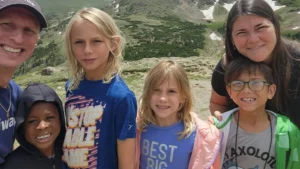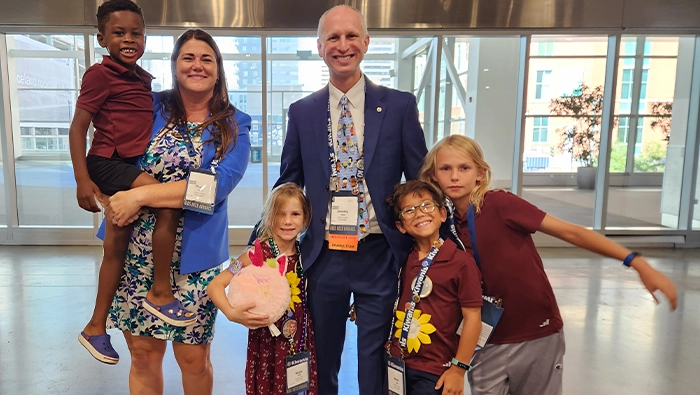A Florida couple has back-to-back terms as district governor while supporting foster care at home and in the community.
By Maggie Gunther, Kiwanis Club of Fort Lauderdale, Florida, U.S.
When some people think of community service clubs, they imagine logos on a town’s welcome sign, older men meeting weekly over a meal and officers presenting the occasional check to a charity. Those can still be true, but the Kiwanis Florida District shows that there is more to our organization: It has the distinction of being the first North American district to be led by a married couple serving back-to-back terms as governor.
After Prairy Riehl’s term wraps on September 30, her husband, Jeremy, will start his term the next day.
As Kiwanians well know, serving in this leadership role is no small act. For a couple to take on this multiyear servant leadership commitment in consecutive years would be a feat of time management and organization for anyone, but the Riehl’s aren’t just anyone — they are also the parents of four children ages 10 and under.
Meeting and marrying
Married in 2007, the couple met in 2005, both already lifelong servant leaders. Jeremy, now 49, grew up in Kiwanis Service Leadership Programs (SLPs) and Boy Scouts in upstate New York, U.S. He earned the rank of Eagle Scout while leading the Beacon High School Key Club and went on to cofound the Circle K International club at his undergraduate alma mater, Rensselaer Polytechnic Institute, where he earned a bachelor’s degree in electrical engineering in 1997. As a senior in college, he was recruited by Lockheed Martin in Orlando, where he still works, now as a senior manager. A job benefit included free tuition to University of Central Florida (UCF), where he earned a master’s degree in computer engineering. UCF had an active CKI club, which he joined; he went on to lead the CKI Florida District as governor in 2000-01.
Prairy, now 43, was born in Vermont and raised in Titusville, Florida, U.S.
“I grew up doing service all my life,” she says, “especially with kids.”
Her mother taught a class of pre-K students with physical disabilities. When Prairy was in high school, she volunteered with the class after the school day ended. She also was part of a high school service organization, Chi Kappa. After earning her bachelor’s degree in Christian studies from North Greenville College in South Carolina, Prairy joined the Peace Corps. She was sent to Morocco to serve but her tenure was cut short after eight months when the Iraq war broke out. She returned home to Central Florida and became a middle school math teacher. In 2005, she was assigned to the new Legacy Middle School, built on land previously owned by Lockheed Martin, adjacent to Jeremy’s workplace.
Prairy’s vice principal asked her to be the faculty advisor to the school’s new Builders Club; Jeremy, who had just joined the club’s sponsor, East Orange County Kiwanis Club, was asked to be the Kiwanis advisor for the Builders Club. They first met at a gathering for the more than 20 SLP clubs supported by East Orange County Kiwanis — and their first date was dinner after building a playground at a women’s shelter a few weeks later.
Building a family
Even before they married, Prairy and Jeremy were on the same page about starting a family. Leading up to their wedding, Prairy converted to Catholicism, and the couple took Pre-Cana courses required by the church. Discussions during those courses included whether there was a desire to have or adopt children.
“I wanted to have 12 kids — six biological and six adopted,” Prairy says. “I always wanted to adopt.”
Not long after they married, they both completed advanced degrees. And with a love for kids, they were also eager to begin having some of their own. However, this proved to be challenging, and they sought help, eventually using in vitro fertilization (IVF). They were overjoyed when they became pregnant with twins in 2012. That joy turned to heartache later that year, when they suffered the loss of the twins, who were stillborn.
They ultimately went through three rounds of IVF before having their first biological child, a boy, in 2014. Following his birth, they attempted several more times with the remaining eggs, resulting in only brief pregnancies followed by loss. After some healing and prayer, they decided to become foster parents, which they had learned about through a series of guest speakers who visited their Kiwanis club. The speakers educated them on the realities of foster care and even recruited them to serve on a local foster advisory board.
Their next child, who is now eight, came into their care on Father’s Day weekend of 2016. He was extremely premature, born 15 weeks early at just 2 pounds, 11 ounces, causing him to require months of care in the neonatal intensive care unit. In most foster care situations, children live with a foster family just long enough to be reunited with their biological family. His case was unusual because his mother was unable to care for him, so Jeremy and Prairy had the opportunity to adopt him. Now they all have a close relationship with his mom and see her regularly.
After moving forward with his adoption, they learned they were pregnant with their second biological child, a girl, who was born in 2017. When she was a year old, they decided to open their home again to foster care, while having three children aged four, two and one already at home. Then another little boy came into their care in 2018. He, too, became eligible for adoption, which they successfully pursued two years later, despite the pandemic complicating and slowing down the process.
“We didn’t go into fostering wanting to adopt,” says Jeremy. “Most foster families have dozens of kids come in and out of their homes. It is unusual having had three placements and adopting two of the kids.”
Prairy adds that they will open their home again after both finish their terms — and once all their kids are out of car seats.
“We max out at four car seats,” she says.

Community outreach
The Riehls have used their Kiwanis platform to promote foster care awareness and provide much needed support and resources to foster organizations through their shared project, Building Family Connections – Fostering a Brighter Future. Given the Kiwanis focus on serving children, it’s a perfect fit.
“There are never enough foster parents for the number of kids that come into care. There is a constant need for new foster parents,” says Prairy.
Through their personal efforts, a handful of people have been inspired to become foster parents, and many more have cleared up misconceptions of what is required in foster care.
“You don’t have to always say yes. People fear that they will have to take whoever comes next. Alleviating that fear is so helpful for people who may be undecided or thinking about fostering.”
Florida Kiwanians have embraced the couple’s mission. Often, kids being placed in foster care have nothing but the clothes on their back. So Kiwanians have assembled thousands of duffel bags filled with toiletries and blankets and donated them to foster care agencies. Clubs also invite foster care speakers to attend meetings and share their message.
Kiwanis clubs in the state also partner with Healthy Families Florida, a nationally accredited home-visitation program for expectant parents and parents of newborns experiencing stressful life situations. Such efforts, Prairy says, prevent kids from being taken from their homes in the first place. The organization reports that 99% of children remain free of “verified maltreatment” one year after completing the program.
The coming Kiwanis year
In preparation for the new Kiwanis year, the Riehls’ focus is also on growing and retaining members and clubs. They believe developing a love for servant leadership early in life — as they did — is key.
“We would love a world where every school can have a Service Leadership Program,” says Prairy.
In a full-circle moment in 2024, Jeremy and Prairy attended the SLP meeting for their Kiwanis club, where they first met 19 years ago. This time, Prairy was serving as district governor, Jeremy was governor-elect, and their son was a K-Kids club member.
“Our kids know Kiwanis so well,” Prairy says. “We wanted to serve as governors when they were still young and impressionable so they will see the importance of being servant leaders.”
Maggie Gunther is the current public relations chair for the Kiwanis Florida District.

